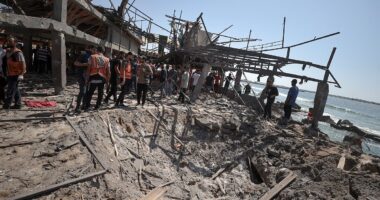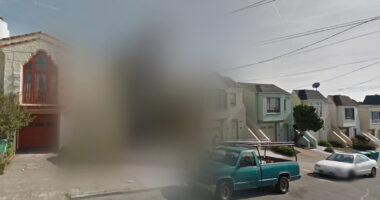SYRIA’S new regime has already backed down from confronting Israel despite a massive wave of airstrikes across the country.
More than 60 airstrikes in the past 12 hours have caused extensive damage, focusing on military infrastructure and ammunition depots in what has been called the most intense bombing campaign in over ten years.




An Israeli “earthquake bomb” also hit a munitions depot near Tartus, northwest Syria, bringing the IDF’s carpet of blitzes to an even larger scale.
The massive blast, which was powerful enough to register as a 3.0-magnitude quake on nearby seismometers, shocked the region after the fall of dictator Bashar al-Assad.
Under Syria’s new unofficial leader, Ahmed al-Sharaa, there are indications of a shift towards avoiding conflict with Israel after a series of widespread airstrikes throughout the conflict-torn nation.
He declared: “The Israelis have clearly crossed the disengagement line in Syria, which threatens a new unjustified escalation in the region.”
But despite the harsh rhetoric, he admitted: “The general exhaustion in Syria after years of war and conflict does not allow us to enter new conflicts.”
The fresh leadership in Syria, led by al-Sharaa and his Hayat Tahrir al-Sham (HTS) coalition following the ouster of Bashar al-Assad last week, has made it clear that their priority is reconstruction and stability, not another costly military engagement.
Al-Sharaa pledged to disarm Syria’s factions and centralise power under the state, a stark contrast to the decades of hostility toward Israel under the Assad regime.
“We must focus on rebuilding, not fighting,” he said during a press conference in Damascus, adding that Syria’s ability to defend itself is severely hampered.
This admission comes as Israel’s relentless air campaign cripples Syrian air defence systems and military infrastructure.
Israeli forces have also reportedly expanded their ground presence in Syria’s southwest, including in the United Nations-patrolled buffer zone on the Golan Heights.
The UK-based Syrian Observatory for Human Rights (SOHR) reported that Israel launched 61 missiles overnight, targeting key military warehouses and air defences in Damascus, Homs, and Hama.
Eyewitnesses described the strikes as devastating, with footage emerging of explosions ripping through a military camp near Damascus.
Al Jazeera confirmed reports of Israeli tanks stationed in villages in the Quneitra region, where roads, power lines, and water networks have been systematically destroyed.
The focus of the strikes, according to analysts, is not only to eliminate potential threats but to ensure Syria remains incapable of resisting further Israeli advances.
This strategy mirrors Israel’s long-term approach since it seized the Golan Heights in 1967 and annexed the territory in 1981.


Israeli Prime Minister Benjamin Netanyahu defended the military action.
He said: “We have no interest in confronting Syria, but we will take any measures necessary to prevent terrorist elements from threatening our borders.”
Netanyahu also announced a new “demographic development” plan to double the number of Israeli settlers in the Golan Heights, prompting international backlash.
Saudi Arabia and Qatar condemned the plan as a violation of international law and a threat to Syria’s stability.
Meanwhile, tyrant Bashar al-Assad has broken his silence to claim Vladimir Putin forced him into a cowardly escape from Syria – but he wanted to stay and fight.
The ousted tyrant released a statement from Moscow, insisting he had to flee after the Russian base he was hiding in began to be bombed.
Assad dished out fighting talk from the safety of his bolthole in the Russian capital, saying the only course of action had been to stay and fight – before he then left.
Why is Israel striking Syria?
By Patrick Harrington, Foreign News Reporter
ISRAEL has been launching airstrikes at targets across Syria since Sunday.
The strikes are concentrated in the west and south, near the capital Damascus.
Most of the strikes are to destroy weapons and ammunition that belonged to President Assad’s forces.
Israel says it must act quickly to destroy the military equipment to stop it “falling into the hands of extremists”.
Many of the strike sites have been air bases, but Israel also targeted a naval base and a scientific research centre linked with chemical weapons.
There are legitimate fears that the coup in Syria could lead to a resurgence in ISIS forces, according to a UK terrorism lawmaker.
Jonathan Hall KC warned Syrian jails are holding “some of the most dangerous Islamic State fighters” who, if released, “would no doubt form a kernel” for a new wave of ISIS.


















